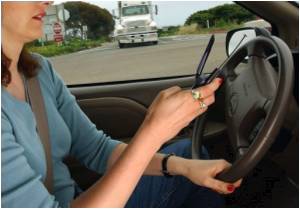Distraction owing to texting or talking on mobile is farfetched to get drivers into trouble on the road, even too much thinking can result the same, warn researchers.

As US car makers and road safety officials debate new guidelines for devices in cars that can distract drivers, the MIT team already is studying the next front of distracted driving: how a driver's eyes can be directed toward the road but their mind focused elsewhere.
The group, led by Bryan Reimer, a research scientist at MIT's AgeLab, found that a driver's ability to focus on the driving environment varies depending on the ''cognitive demand'' of a non-driving activity.
That is, the deeper the level of thought in a driver's mind, the less focus there is on the surroundings. Good drivers routinely scan the road ahead and around them, looking for potential hazards that they might need to react to.
When drivers face even light levels of cognitive demand, they scan the road less, Reimer said.
''In the past, the emphasis was on whether you're distracted or not distracted. This is too simple of a categorisation. There are levels of cognitive demand, and those levels are statistically distinguishable," he stated.
Advertisement
The research comes as car makers and transportation officials meet in Washington this week on whether smart phone and portable GPS makers should be included in federal efforts to combat driver distraction.
Advertisement
In the easy task, drivers were given a series of single-digit numbers, 0-9, and asked to repeat aloud each as it was given. In the medium-demand task, participants were asked to repeat the number given a digit earlier in the sequence; for the high-demand task, the number given two digits earlier.
''Even the easy task reduces the amount you're scanning,'' Reimer explained.
''You're scanning the road a little less. At the medium- and high-demand level, you're scanning even less. It's called a loss of situational awareness. At the low level, you're less aware. At medium and high levels, you're even less aware," he said.
It's a common phenomenon on modern roads: a driver is talking on a hands-free phone and driving perfectly straight - but slower than the flow of traffic.
Reimer noted that distracted drivers, who are focused on the road ahead but not on the surrounding environment, actually drive straighter but have been shown to react slower to a car braking in front of them.
The study was published in Human Factors: The Journal of the Human Factors and Ergonomics Society.
Source-ANI












